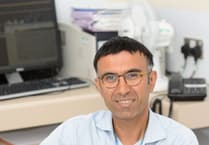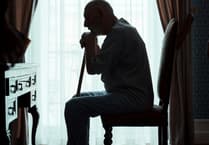A BBC film crew headed to Farnham Centre for Health this week to speak to NHS staff about the hospital’s role in the coronavirus pandemic.
The resulting footage (see below) was broadcast on Thursday, May 7 – including interviews with formerly-retired GP Dr John Rose and Farnham’s lead Covid-19 GP Dr Ed Wernick.
Topics discussed included the hospital’s newly-created ’ward GP’ role, designed to free up consultants to care for more serious Covid-19 cases at Frimley Park Hospital, and the return to planned, non-urgent care.
It comes after the GP leading Farnham’s response to coronavirus, Dr Wernick told the Herald health workers are planning for Covid-19 restrictions to remain in place for another “12 to 18 months”.
In a letter to staff, NHS chief executive Sir Simon Stephens announced the health service has now moved into ‘phase two’ of its Covid response – and praised “the remarkable NHS response to the greatest global health emergency in our history”.
Echoing the comments of the prime minister, Sir Simon added the UK is now through the peak of the virus.
However, as Downing Street Group Practice GP Dr Wernick stresses, this “doesn’t mean we can’t return to a new peak”.
“We shouldn’t be complacent and must continue with all the social isolations and infection prevention measures,” Dr Wernick added, commenting that although some relaxing of lockdown measures are anticipated, restrictions on our daily lives are expected to be with us for some time yet.
Until a vaccine is produced or ‘herd immunity’, reliant on 60 to 80 per cent of the population catching the virus, is achieved, “the pandemic will be with us in the UK”, he said.
A promising vaccine is being developed by researchers at Oxford Vaccine Group, and has now reached the human trial stage.
But Dr Wernick added: “We’re being told we need to be planning for Covid restrictions to be in place for 12 to 18 months, because until you get to that point of herd immunity, or produce a vaccine, you’re still going to be trying to control the spread.”
Local healthcare systems are, Dr Wernick added, being asked to think about how best to resume some routine non-urgent elective care, such as a cataract removal, hernia repair or hip or knee operations, focusing on patients on long waiting lists.
He continued: “We’ve been asked to think about what the next phase will be – how can we make sure we have the skills, capability and capacity for looking after Covid patients – but where there is surplus capacity, how do we start turning on planned care?
“How do we make sure that if someone is unwell with Covid, we look after them, but also keeping people in the best possible health so if they do contract Covid, they are as resilient and healthy as possible to fight the disease?”
The NHS is better equipped to cope with a surge in Covid cases than it was a month ago. But key to NHS bosses’ decision making, says Dr Wernick, is “how do we try to get back to looking after planned care while not allowing increased numbers of Covid cases?”
The ongoing roll-out of community testing is key to this aim, allowing for the pre-admission testing of all elective patients – but other factors include availability of crucial supplies such as personal protection equipment, blood and medicines.
Dr Wernick added last week’s message, shared by the NHS nationally as well as through the Herald, that the NHS is ‘open for business’ for non-Covid patients has already “gained some traction”.
“We’ve definitely got increasing numbers of people contacting us for non-Covid, both urgent and planned care, healthcare-related issues, which is good,” he said.




